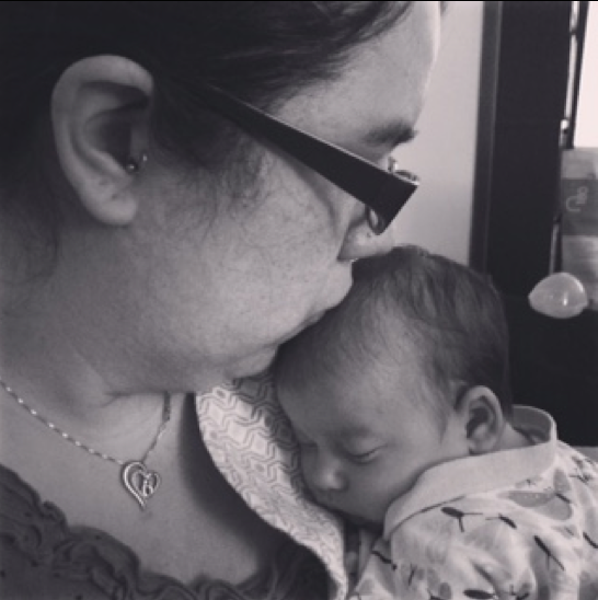What You Should Know Before Saying It's 'Normal' for a New Mom to Have Anxiety
Postpartum mood disorders are more common than people think, yet it’s something that isn’t openly talked about. I myself have been battling with postpartum anxiety (PPA) since my daughter’s birth in September, and it has taken me since then to feel strong enough to talk about it.
I know many of you are thinking: “You’re a new mom, you’re going to feel anxious! That’s just a part of being a parent.” Postpartum anxiety is not your run-of-the-mill, new mom anxiety. It’s a whole different kind of monster. It’s a kind of anxiety that keeps you from being able to sleep even when you’re the most tired you’ve ever been in your life. It’s a moment of sheer panic that will bring you out of your deepest REM cycle, leaving you shaking and breathless. It’s a non-stop scrolling of upsetting thoughts, images and worst case scenario “what ifs.” It’s a rock in the bottom of your stomach that just won’t go away. It’s the bitter taste of irrational anger that turns into mean comments directed towards the ones you love. It’s a vice that holds you in a place of fear, making it nearly impossible to leave your home. It’s a shiver that runs up and down your spine, and an ache that sits on your chest. It is one of these things alone and all of these things at the same time, and even in the joyful moments, it is always present. Although you are smiling and laughing with family and friends, it’s a cold hand around your throat, reminding you that this is a monster you cannot escape.
The worst part about it is, you begin to believe this is just your new normal. You begin to convince yourself you must be a terrible parent, a weak woman, a bad person, because no one ever talked about a fear that would be so overwhelming and unexplainable it would leave you sobbing over the kitchen sink. Obviously you were just not made to be a mother.
Then one day, in a moment of utter hopelessness, you decide to talk about it. You call a friend, or text your brother or sob to your husband, and they all tell you that it’s not normal to be feeling this way. They suggest you see a doctor. But most importantly, they assure you that everything will be OK, and for a moment the weight of the monster doesn’t feel as heavy, because now other people are carrying it with you.
This has been my experience with PPA, and I know it is not an experience I alone have faced. After speaking with my obstetrician, seeing a psychologist and going on a low dose of (breastfeeding safe) medicine I have begun to feel a huge difference. I still struggle daily with anxiety, and I know I will for a while, but I have the tools and resources now to help myself. I am beginning to feel like myself again and have been able to develop some coping skills for when things get particularly difficult.
Even though I know what I have experienced is not my fault, I can’t help but struggle with feelings of shame and guilt. I recognize this is something in my life I should not be ashamed of, and I continue to work on re-mediating those feelings by talking about it to my doctor. For this reason especially, I have decided to share my story so it no longer is a secret I must bear. I hope women who are reading this and experiencing the same thing understand:
1. Anything you may be feeling is an emotion that is yours and yours alone, no one can tell you to stop feeling that way or “snap out of it.”
2. This is not your fault and you could not have done anything differently to avoid it!
3. This is not forever, get the help you need — and soon you will be able to look back on this time as a rough patch in your postpartum journey.
Most importantly, I am breaking my silence for my daughter, who one day may be a mother, too. I want her to grow into motherhood in a world where mothers are supported and not shamed for struggling with postpartum life. It is not a change that will happen overnight, but maybe if more women begin to share their stories of the struggles and strife of womanhood, they will no longer be seen as experiences of “the other,” rather the moments that many will go through at some point in their lives. Maybe in time the shame, guilt and secrecy will be no more.
If you or someone you know is struggling with postpartum mood disorders, or if you want to know more information, I’ve found this resource particularly helpful.

The Mighty is asking the following: Tell us a story about a time you encountered a commonly held misconception about your mental illness. How did you react, and what do you want to tell people who hold his misconception? If you’d like to participate, please send a blog post to community@themighty.com. Please include a photo for the piece, a photo of yourself and 1-2 sentence bio. Check out our Submit a Story page for more about our submission guidelines.
